How Long Can A Human Really Go Without Sleeping?
Consider the following apparently unrelated facts. Number one: new streaming services are being released seemingly by the hour, resulting in moment-by-moment cultural zeitgeists like Baby Yoda and whatever season three of Westworld is supposed to be about. Secondly, according to Business Insider, a minimum wage worker would need to work three full time jobs to afford a two bedroom apartment. Combine these two inescapable truths and you have to ask yourself "how much sleep do I need if I don't want to die?"
Never sleep again (actually, probably do)
Every human body is different, so asking "how long can a person go without sleep" is sort of like asking "how long can a person go without watching Cardi B interviews where she does that chirp noise." The answer is going to vary from depending on the age and physical needs of the person in question. Additionally, it may come as a surprise to learn that sleep science is still a relatively new and mysterious field. But here's what we know so far:
According to a 2010 report in the International Journal of Occupational Medicine and Environmental Health, the longest a person has ever gone without a nap is 264 hours, or about 11 straight days. Before you get all bright eyed and ambitious, trying to make a name for yourself by breaking that streak, you should know what happens to your sweet brain after that much unrelenting consciousness.
Per Science Direct, the first 24 hours are the easiest, with effects limited to freshman issues like drowsiness, memory impairment, and blurred vision. After 48 hours, you can look forward to "microsleeps," or short, uncontrolled bursts of unconsciousness. Your immune system will also start to suffer, as there's the potential for your NK cell count to dramatically decrease.
Making it to the three day mark will put you deep in Nightmare on Elm Street teenager territory. Reported symptoms of sleep loss at this level run the gamut from paranoia and anxiety to full-blown hallucinations.
Long story short, there's no recorded upper limit on how long a person can stay awake and survive, but the threshold for horrifying physical and mental effects is astonishingly low. The point here is, The Mandalorian will still be there after you take a nap.

